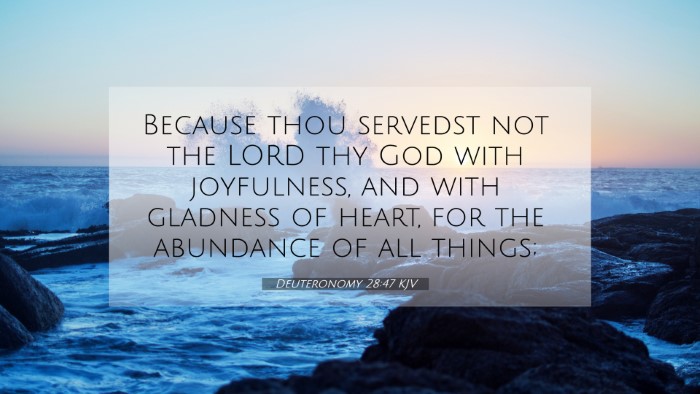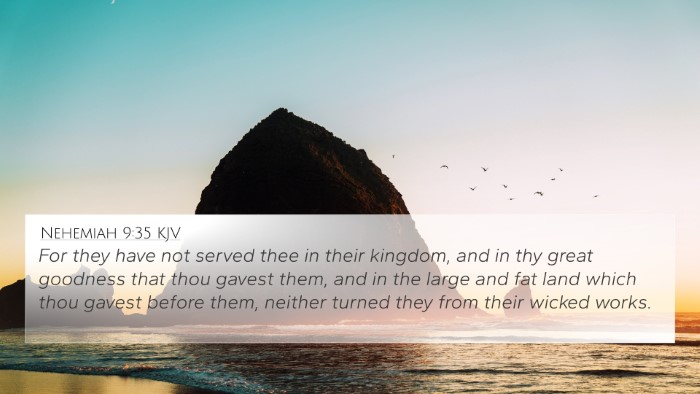Understanding Deuteronomy 28:47
Verse: Deuteronomy 28:47 - "Because you did not serve the LORD your God with joy and gladness of heart, for the abundance of everything..."
Summary of Meaning
This verse highlights a profound consequence for failing to serve God with joy and gratitude. It reflects the expectation that one's service to God should be driven by a heart full of gladness, especially in light of the blessings that He has provided. Theological insights from public domain commentaries suggest that this neglect of duty would lead to adverse outcomes, both in spiritual and material aspects of life.
Commentary Insights
Matthew Henry's Commentary
- Contextual Background: Matthew Henry emphasizes the importance of obedience that stems from a sincere heart. He comments on the idea that gratefulness should motivate one’s service to God, and when this is lacking, it invites negative repercussions.
- Consequences of Neglect: He notes that failure to follow God joyfully leads to being burdened by external adversities, suggesting that one's attitude in worship is foundational to experiencing God's blessings.
Albert Barnes' Notes
- The Implication of Joy: Barnes points out that joy in serving God corresponds with a deep recognition of His provision and love, and a lack thereof invites a cycle of misfortune.
- Spiritual Reflection: He highlights that joyless service results in a disconnect from God's goodness, leading to despair rather than hope.
Adam Clarke's Commentary
- Heart Attitude: Clarke notes that the verse reflects God's expectation of heartfelt worship and service, intertwined with the enjoyment of relationship with God.
- Rejecting Blessings: He elaborates on the travesty of rejecting the abundance of God's blessings which are meant to inspire grateful hearts to worship.
Cross-References to Deuteronomy 28:47
Several biblical passages resonate with the themes found in Deuteronomy 28:47, illustrating connections about service, gratitude, and consequences:
- Deuteronomy 10:12-13 - Stresses the importance of loving God and serving Him with all one's heart.
- Psalm 100:2 - Encourages coming before God with joyful songs, highlighting worship's heart posture.
- Isaiah 1:19 - Points to the blessings that come with obedience and joyful service to God.
- Romans 12:1 - Calls for living sacrifices as an act of worship, echoing the need for heartfelt service.
- Philippians 4:4 - Instructs to rejoice in the Lord always, indicating an intrinsic link to the service we provide.
- 1 Thessalonians 5:16-18 - Encourages rejoicing and giving thanks, which relates to the joyful service mentioned in Deuteronomy.
- Colossians 3:23-24 - Advocates working heartily for the Lord, reinforcing the theme of serving joyfully.
Thematic Bible Verse Connections
The themes of service, gratitude, and God’s blessings are interwoven throughout scripture, creating a comprehensive understanding:
- Joyful Worship: The connection is made to verses like Psalm 95:1-2, which invite believers to engage joyfully in worship.
- The Cost of Neglect: Reflects in Luke 17:11-19, where the ungrateful healed lepers illustrate the importance of recognition and gratitude.
- Blessings and Burdens: Proverbs 1:28-31 aligns with the concept of suffering consequences due to rejection of God’s call.
Tools for Bible Cross-Referencing
Understanding the connections between Bible verses can deepen one's spiritual insight. Here are some tools:
- Bible concordance - A valuable resource to locate verses and their meanings.
- Cross-reference Bible study guides - Offer structured methods for exploring biblical relationships.
- Online Bible-search tools - Efficient ways to find and compare related scriptures.
Conclusion
Deuteronomy 28:47 serves as a reminder of the significance of joy and gratitude in our service to the Lord. The interconnectedness of the Bible encourages believers to delve deeper into scripture through cross-references, fostering a richer understanding of God’s expectations and blessings.
For those engaged in sermon preparation or personal study, remembering the relational dynamics in these themes can guide the exploration of faith and obedience.







